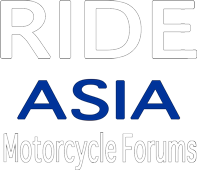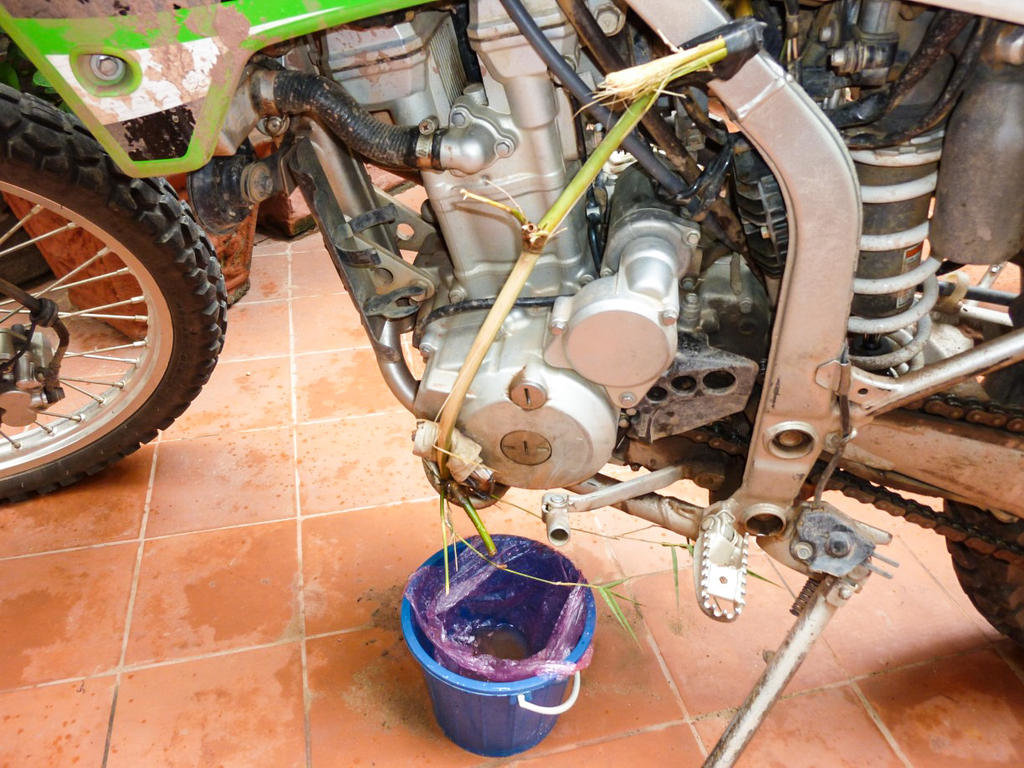You are using an out of date browser. It may not display this or other websites correctly.
You should upgrade or use an alternative browser.
You should upgrade or use an alternative browser.
Emergency repairs
- Thread starter KTMphil
- Start date
Gnasher328
Senior Member
- Joined
- Aug 9, 2012
- Location
- Chiang Mai / New Forest, England
- Bikes
- Ducati 851 & Mille S2, HD FXR, Trumpet R3, BMW R100RS, CRF 250
Ingenious - Heath Robinson lives on!
- Joined
- Aug 15, 2012
- Bikes
- KTM 613 EXC, BMW R90S & Dakar, MZ250, Norton 16H, Honda - 500 Fs & Xs, DRZs, XLs XRs CRFs CT110s etc
Nice fix... but definitely gotta have a sumpguard.
I made a better, more encompassing, one for my Super Enduro out of carbon/kevlar

Making the mould is the hard part.
Incidentally, I holed my old BMW M5's sump in an excursion from the track at Symmons Plains in Tasmania... the day before a 1000+km drive home. A bit of knead-it epoxy did the trick
I made a better, more encompassing, one for my Super Enduro out of carbon/kevlar

Making the mould is the hard part.
Incidentally, I holed my old BMW M5's sump in an excursion from the track at Symmons Plains in Tasmania... the day before a 1000+km drive home. A bit of knead-it epoxy did the trick
bikesncats
Senior Member
Holed crankcase
Middle of nowhere in Laos, a holed ... crankcase.....
Bush mechanics...some say it's useless, I say IT IS ESSENTIAL, it is what gets you home...
Ingenious repair for lack of other available options. Well done!
I always carry epoxy with me. In this case, already happened to me as well, cleaning well the area and rinsing it with alcohol (I always have a bottle of Isopropyl or Ethyl/Methyl alcohol in my pharmacy) then patching with metal filler epoxy always works wonders and lasts impressively long (on the XS1100 I had to change the pan because I couldn't remove the epoxy). Good quality epoxy always pays off as alexuk pointed out.
colvfrfg
Junior Member
Hi Guys,
What epoxy(s) do you recommend?
Colin
What epoxy(s) do you recommend?
Colin
KTMphil
Senior member
Hi Guys,
What epoxy(s) do you recommend?
Colin
Any 2 part epoxy is fine. Liquid Metal is useful as it has an added filler to make it malleable & stays in place easier. I prefer a runny epoxy with a quick dry 5 minute hardening time. To make the runny epoxy stay in place, I use a piece of bandage or tissue paper saturated in the mixed epoxy over the repair area.
bikesncats
Senior Member
Alteco, Loctite, Araldit, V-Tech, Pattex...
Most true epoxy resins (usually Bisphnol-A or Novolac based) are the most expensive glue and filler/matrix types.
On the more economical side we see Polyester and Vinyl-ester resin based "epoxies". The advantage is polyester resins are much cheaper to produce bulk materials and build up thickness. Vinyl-ester is less prone to cracking and more suitable for applications with metal filler as it wets the surface better providing better adhesion and is more resistant to contact and immersion with fluids. Vinyl-esters are best for those small plastic fairing repairs and with steel filler for non crucial (not subject to mechanical loads) aluminum repairs, punctured engine block like in this case.
Bisphenol-A based resins (especially polyacrylate modified) offer some of the strongest resins available (as high as 90-100MPA, or the equivalent of your alloy frame) and Novolac based resins are the best options for paste sticks usable in wet and even under water.
Most good manufacturers do mention the material and its best range of applications, reading the instructions usually helps choose the best option for the application.
Generic do it all epoxy are usually "cheap" polyester formulations and while adequate for repairs around the house, I personally avoid them for critical repairs that need to get me out of a sticky situation.
IMO it is worth spending the extra money and carry a couple of variants - Vinyl-ester metal filler (usually 5 to 15 min quickset), paste sticks (workable for approximately 30min and setting over night) and a high strength epoxy formulations 5 min quickset and also a standard setting, its the strongest requiring overnight curing but offers huge strength and can save mechanical parts for as long as it takes to get back home or at least to a repair shop.
Most true epoxy resins (usually Bisphnol-A or Novolac based) are the most expensive glue and filler/matrix types.
On the more economical side we see Polyester and Vinyl-ester resin based "epoxies". The advantage is polyester resins are much cheaper to produce bulk materials and build up thickness. Vinyl-ester is less prone to cracking and more suitable for applications with metal filler as it wets the surface better providing better adhesion and is more resistant to contact and immersion with fluids. Vinyl-esters are best for those small plastic fairing repairs and with steel filler for non crucial (not subject to mechanical loads) aluminum repairs, punctured engine block like in this case.
Bisphenol-A based resins (especially polyacrylate modified) offer some of the strongest resins available (as high as 90-100MPA, or the equivalent of your alloy frame) and Novolac based resins are the best options for paste sticks usable in wet and even under water.
Most good manufacturers do mention the material and its best range of applications, reading the instructions usually helps choose the best option for the application.
Generic do it all epoxy are usually "cheap" polyester formulations and while adequate for repairs around the house, I personally avoid them for critical repairs that need to get me out of a sticky situation.
IMO it is worth spending the extra money and carry a couple of variants - Vinyl-ester metal filler (usually 5 to 15 min quickset), paste sticks (workable for approximately 30min and setting over night) and a high strength epoxy formulations 5 min quickset and also a standard setting, its the strongest requiring overnight curing but offers huge strength and can save mechanical parts for as long as it takes to get back home or at least to a repair shop.
alexuk
Senior Member
- Joined
- Jan 30, 2011
on the XS1100 I had to change the pan because I couldn't remove the epoxy
the welding shop just burnt it off with an acetylene torch, then TIG welded it in situ
jkrfjessjess
Senior Member
- Joined
- Nov 10, 2011
- Bikes
- Honda Wave
Any 2 part epoxy is fine. Liquid Metal is useful as it has an added filler to make it malleable & stays in place easier. I prefer a runny epoxy with a quick dry 5 minute hardening time. To make the runny epoxy stay in place, I use a piece of bandage or tissue paper saturated in the mixed epoxy over the repair area.
Perhaps a small amount of gauze could be added to za "minimalist" tools kit . This vould not be affected by sveat ( az tissue could be ) pouring from za individuals brow during za process unt thus keeping malleability at its most pleasing .
bikesncats
Senior Member
the welding shop just burnt it off with an acetylene torch, then TIG welded it in situ
Problem is, with metal filler epoxy, by burning it off you cause more damage and end up with a hole too big to just weld, a patch would have to be shape formed to fit and welded on...a scrap yard replacement was 10bucks back then, and the epoxy fixed component made a nice mantle piece and object for conversation.
Jessjess...gauze should always be with you...in your first aid kit and/or pharmacy box. I always carry both, alcohol and gauze in the pharmacy box...useful for injuries but also for the injuries of our non-organic travel companions.


